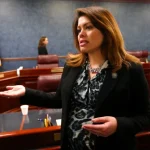

(The Center Square) – With a full 30-day month, North Carolina’s gross wagering revenue cleared $105 million in April – up more than $38 million on the first month launch of legal sports gambling.
March counted just the final 21 days following the long-awaited beginning on the Monday of the ACC men’s basketball tournament. Selection Sunday for the NCAA Tournament followed and N.C. State went on an unprecedented run from the league, winning the conference showcase with five triumphs in as many days and eventually reaching the Final Four the first weekend in April.
The end of the NHL regular season and the first full month of Major League Baseball were significant timelines for April.
The gross wagering revenue has an 18% tax rate, meaning the state’s take was $18,945,301 on the $105,251,672. Combined with $11,969,318 in the first month, state coffers have gained $30,914,619 heading into May.
Bettors won more than $538 million.
Gross wagering revenue is the total of amounts received by interactive sports wagering operators from sports wagers as authorized under state law, less the amounts paid as winnings before any deductions for expenses, fees or taxes. It’s the sum multiplied by 18% that yields money for state coffers.
Five things, per Session Law 2023-42, can happen with the proceeds. There’s $2 million annually to the Department of Health and Human Services for gambling addiction education and treatment programs; and there’s $1 million annually to the North Carolina Amateur Sports to expand youth sports opportunities.
Also annually, a third element is $300,000 to each of 13 state public school collegiate athletic departments. Fourth is $1 million annually to the N.C. Youth Outdoor Engagement Commission, which awards grants.
Finally, there are certain reimbursements to the state Lottery Commission and Department of Revenue for expenses incurred to implement and administer the new law. After that, it’s 20% to the 13 public collegiate athletic departments; 30% to a new fund to attract major events, games and investments; and 50% to the state’s General Fund.
Of note on the help to collegiate athletics programs, the language of the bill says “to support collegiate athletic departments.” One thing it can’t be used for is name, image and likeness money to athletes.
Times of the year, as seen in other states considered both more heavily collegiate or more heavily professional, can impact a consistent revenue stream from gambling. For example, there’s March Madness in the spring and the NFL season in the fall.
The first two months set a 12-month pace of $185.5 million, and a pace by the June 30 end of the fiscal year of $61.8 million. A legislative fiscal analysis estimated the state’s 18% betting tax will generate $64.4 million the first fiscal year.
CLICK HERE TO READ MORE FROM THE WASHINGTON EXAMINER
Other estimates ranged from $47 million after three years to $126 million in year one.
The collegiate athletics department recipients are Appalachian State, East Carolina, Elizabeth City State, Fayetteville State, N.C. A&T, N.C. Central, UNC Asheville, UNC Charlotte, UNC Greensboro, UNC Pembroke, UNC Wilmington, Western Carolina and Winston-Salem State. The other two institutions in the UNC System are the UNC School of the Arts, which doesn’t play intercollegiate athletics, and a high school, the North Carolina School of Science and Mathematics.





